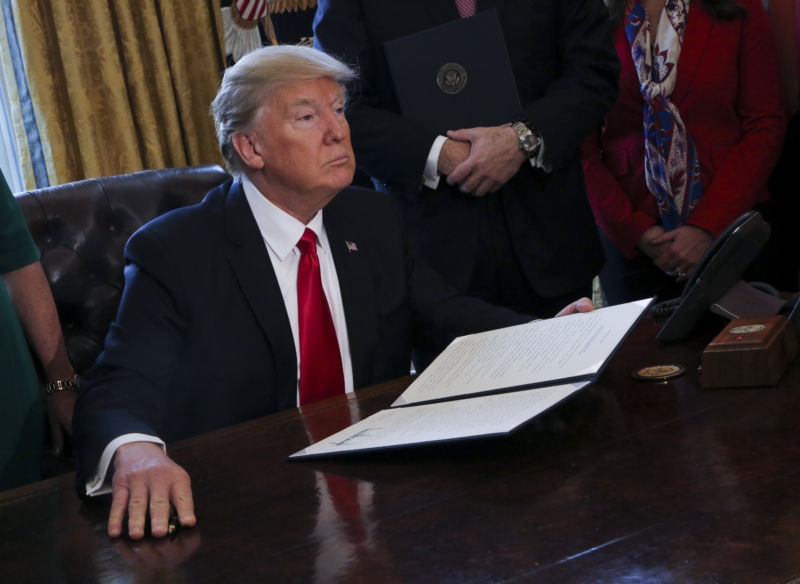Lawsuit joins at least 15 other cases challenging president’s executive order.

Aude Guerrucci – Pool/Getty Images
The American Civil Liberties Union of Northern California has sued the Trump Administration over its recent executive order, which restricts entry into the country for people who hail from seven predominantly Muslim countries.
The new ACLU lawsuit (Al-Mowafak et al v. Trump et al), joins an ever-growing list of cases filed in various federal courts around the country that challenge the legality of the executive order. The lawsuit was filed on Thursday on behalf of a number of California students affected by the order.
What makes the ACLU proposed class action lawsuit remarkable is its creative use of President Donald Trump’s tweets against him. The lawsuit points to specific instances in which the president described the executive order as a “ban” on Muslims.
Or, as Elizabeth Joh, a University of California, Davis law professor, put it:
Can you sue the President based on his tweets? We’re about to find out. @ACLU_NorCal sues on #MuslimBan EO: https://t.co/Yku4uIAl1o
— Elizabeth Joh (@elizabeth_joh) February 3, 2017
Various plaintiffs, including that ACLU, argue that a de facto Muslim ban is unconstitutional. The First Amendment specifically prohibits “establishment of religion,” including the government favoring one religion over another.
As Ars has reported before, the executive order, which was signed last week, restricts entry or re-entry of citizens from seven Muslim-majority countries. The order affects immigrants from Iran, Iraq, Yemen, Libya, Somalia, Sudan, and Syria.
On Friday afternoon, a federal judge in Seattle ruled against the White House by imposing a temporary restraining order against the executive order. The restraining order is nationwide and went into effect immediately. A federal judge in Los Angeles granted a similar restraining order earlier in the week. So far, the government has lost all of its attempts to block such restraining orders. However, also on Friday, in yet another related case, a federal judge in Massachusetts declined to renew a temporary restraining order, which is set to expire on Sunday.
On Wednesday, Microsoft formally asked the US Department of State and the Department of Homeland Security to grant it and other companies an exemption for their affected employees. Microsoft stated that “there is no evidence that they pose a security or safety threat to the United States.”
“Preventing Muslim Immigration”
Amongst the three tweets cited, the ACLU’s civil complaint specifically mentions this one that dates back to nearly a year before the presidential election of November 2016:
Statement on Preventing Muslim Immigration: https://t.co/HCWU16z6SR pic.twitter.com/d1dhaIs0S7
— Donald J. Trump (@realDonaldTrump) December 7, 2015
One lawyer, Eunice Lee, the co-legal director at the Center for Gender and Refugee Studies at the University of California, Hastings, told Ars that Trump’s tweets and other public statements by members of his staff are clear.
“They’re definitely making statements that the executive order is animated by animus towards Muslims,” she said.
According to David Sklansky, a law professor at Stanford University, it’s traditionally very difficult for plaintiffs to show specific animus against a particular protected group—so Trump’s Twitter account is fair game.
“It’s quite extraordinary to have the president of the United States saying publicly, repeatedly, that what we are going to try to do is to single out a constitutionally-protected group,” he told Ars. “It’s quite strong evidence, and it would be remarkable if the plaintiffs didn’t rely on it.”
Similarly, Justin Cox, an attorney with the National Immigration Law Center, who is representing plaintiffs in a similar ongoing case in New York (Darweesh v. Trump), told Ars that such lawsuits are usually based on public statements made by more local public officials—like city council members or state legislators.
“Because those are the folks that are usually saying those sorts of things that are on the public record,” he said. “The president doesn’t typically say racist things out loud where everyone can see it.”
Cox referred Ars to a 1985 Supreme Court decision, Hunter v. Underwood, which turned on an interpretation of a section of the 1901 Alabama Constitution. In a unanimous decision, the Supreme Court found that a portion of the state’s constitution disenfranchised African-Americans and was, therefore, unconstitutional under the United States Constitution. But, as Cox noted, not everything is so clear-cut, and cases like this don’t come up very often.
“Politicians aren’t dumb enough to capture things in explicitly racist terms,” he added. “The case law on these types of claims—you’re talking about other types of evidence, deviations from normal procedures. Politicians don’t say stupid shit like this out loud, so [Trump’s] bucking that trend.”
